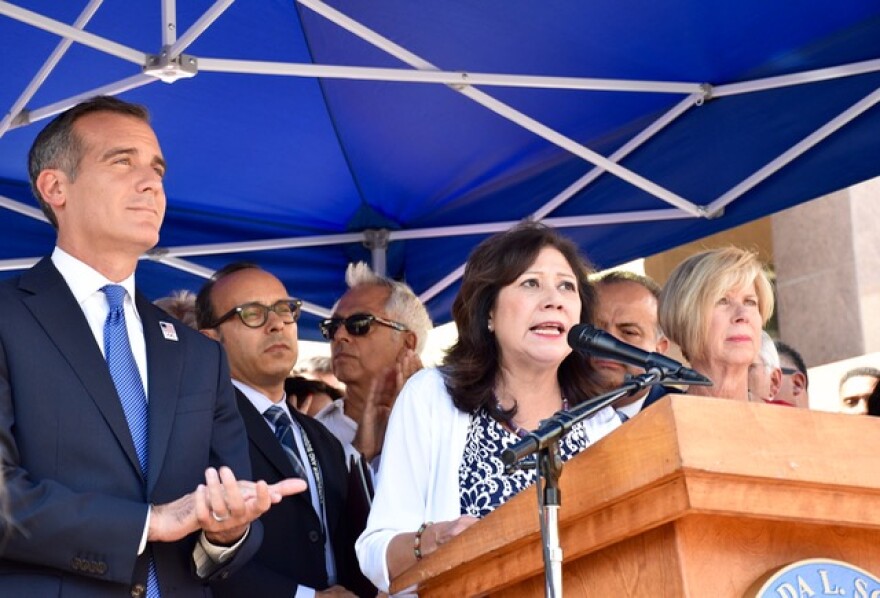With our free press under threat and federal funding for public media gone, your support matters more than ever. Help keep the LAist newsroom strong, become a monthly member or increase your support today.
This archival content was written, edited, and published prior to LAist's acquisition by its current owner, Southern California Public Radio ("SCPR"). Content, such as language choice and subject matter, in archival articles therefore may not align with SCPR's current editorial standards. To learn more about those standards and why we make this distinction, please click here.
County Proposes Official Travel Restrictions To 9 States That Threatened Legal Action On DACA

Hours after Attorney General Jeff Sessions announced plans to formally rescind the Deferred Action for Childhood Arrivals program, two county supervisors responded with a motion that would implement outreach and assistance efforts for L.A. County DACA recipients—and ban official travel to the nine remaining states that threatened legal action unless the administration phased out DACA.
County Supervisor Hilda Solis described plans to put forward a county motion "that will help us empower DACA students" and provide protections through the county's Office of Immigrant Affairs at a press conference outside the Kenneth Hahn Hall of Administration early Tuesday afternoon. The motion, which was co-sponsored by Supervisor Janice Hahn, called President Trump's decision to phase out the DACA program "a heartbreaking blow and cruel exercise of Presidential authority aimed at nearly 800,000 of the most vulnerable young people among us, including 214,000 who reside in California." The motion was introduced before the County Board of Supervisors Tuesday afternoon and will be voted on next week during the September 12 Board of Supervisors meeting.
The DACA program has provided work authorization and deportation relief for nearly 800,000 young undocumented immigrants since 2012, when it was implemented through an executive order by then-President Barack Obama. With more than 220,000 DACA beneficiaries living here, California is home to more DACA recipients than any other state. Texas follows California, with about 120,000 DACA recipients.
There are approximately 100,000 DACA recipients living in the Los Angeles County metropolitan area; if it were a state, the county would have the third-highest number of DACA recipients. Illinois, the actual third-ranking state, has about 42,000 DACA beneficiaries living there—less than half the number represented in the County area.
Solis and Hahn underscored this idea in their motion: "Every state in the U.S. will feel the economic harms from ending DACA. Los Angeles County, a virtual state in its own right, is especially susceptible to these economic harms and the human costs associated with them," they write.
If passed, the motion would do a number of things, including directing the County Office of Immigrant Affairs to conduct outreach efforts to current DACA recipients to assist them with renewing their status before October 5, 2017, and to provide ongoing updates to LA County residents regarding their legal rights. The motion would direct the Office of Immigrant Affairs to work with County counsel to explore immigration relief and residency options for County employees who are DACA recipients.
The motion also proposes a one-year travel restriction to the nine states (Texas, Alabama, Arkansas, Idaho, Kansas, Louisiana, Nebraska, South Carolina, West Virginia) that threatened legal action unless the administration phased out DACA, which would mean that L.A. County employees will not travel to those states for official County business. Exceptions would be made for emergency response and assistance, matters related to the Department of Children and Family Services, Probation, District Attorney, Public Defender, Alternate Public Defender, and any other legally required matters as specifically authorized by the Chief Executive Office, according to the motion.
"We shouldn't be sending people to conferences in their states," Solis said at the press conference. "When you're going to punish our people—because I represent a lot of DACA families and students—then guess what, it's time for people like us who do have a position of authority to say, 'It's got to stop.'"
At LAist, we believe in journalism without censorship and the right of a free press to speak truth to those in power. Our hard-hitting watchdog reporting on local government, climate, and the ongoing housing and homelessness crisis is trustworthy, independent and freely accessible to everyone thanks to the support of readers like you.
But the game has changed: Congress voted to eliminate funding for public media across the country. Here at LAist that means a loss of $1.7 million in our budget every year. We want to assure you that despite growing threats to free press and free speech, LAist will remain a voice you know and trust. Speaking frankly, the amount of reader support we receive will help determine how strong of a newsroom we are going forward to cover the important news in our community.
We’re asking you to stand up for independent reporting that will not be silenced. With more individuals like you supporting this public service, we can continue to provide essential coverage for Southern Californians that you can’t find anywhere else. Become a monthly member today to help sustain this mission.
Thank you for your generous support and belief in the value of independent news.

-
What do stairs have to do with California’s housing crisis? More than you might think, says this Culver City councilmember.
-
Yes, it's controversial, but let me explain.
-
Doctors say administrator directives allow immigration agents to interfere in medical decisions and compromise medical care.
-
The Palisades Fire erupted on Jan. 7 and went on to kill 12 people and destroy more than 6,800 homes and buildings.
-
People moving to Los Angeles are regularly baffled by the region’s refrigerator-less apartments. They’ll soon be a thing of the past.
-
Experts say students shouldn't readily forgo federal aid. But a California-only program may be a good alternative in some cases.







